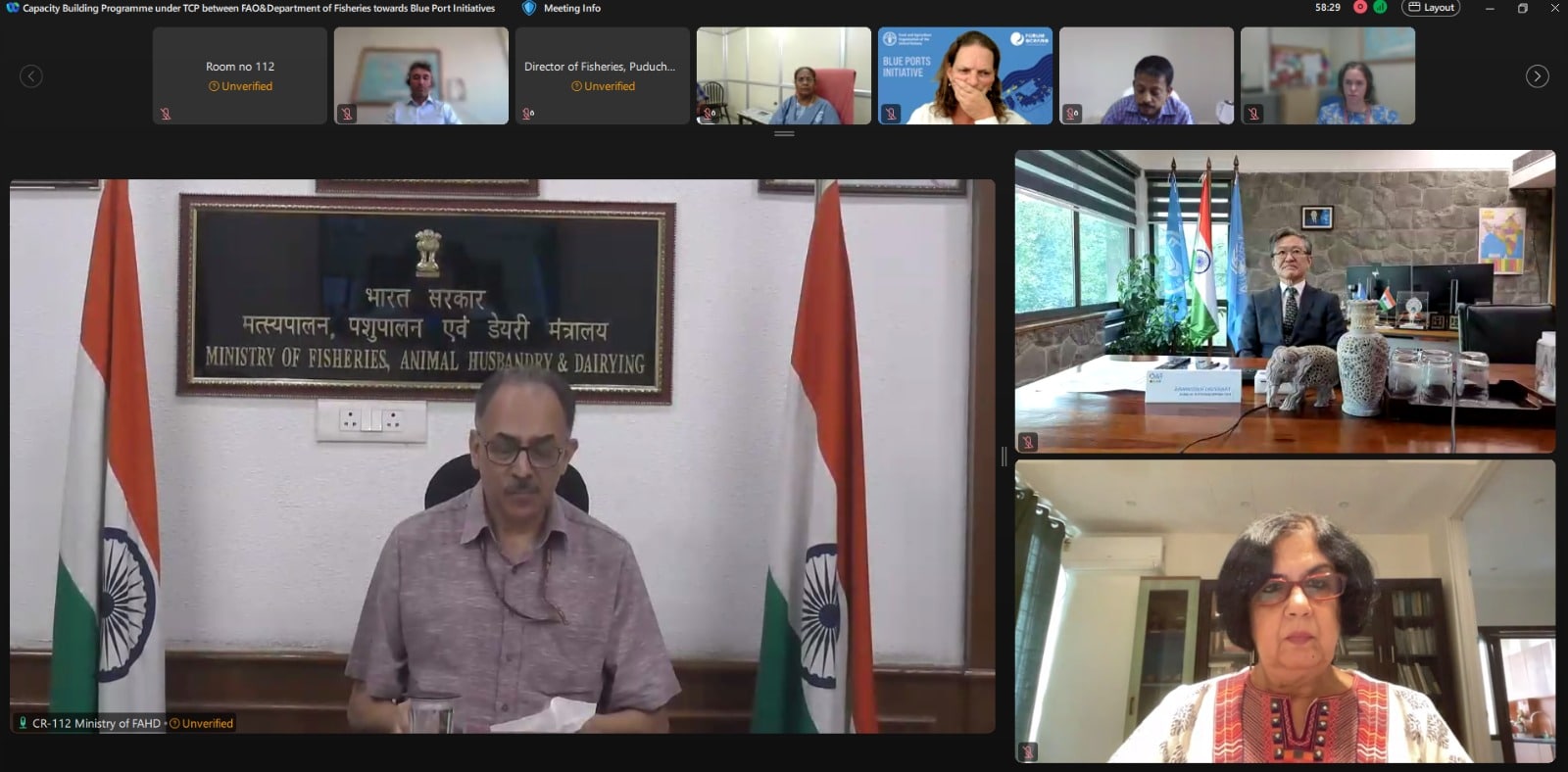India and FAO Collaborate to Develop Blue Ports; First Capacity-Building Webinar Conducted

The Department of Fisheries (DoF) has entered into a Technical Cooperation Programme (TCP) agreement with the Food and Agriculture Organization (FAO) of the United Nations to enhance Blue Port infrastructure across India. This initiative aims to bolster the country’s fishing ports through a series of webinars and workshops designed to share best practices and build capacity. The first webinar, featuring insights from DoF Secretary Dr. Abhilaksh Likhi, focused on the foundational aspects of Blue Ports and their potential to drive economic growth and sustainability in the fishing sector.
Webinar Highlights and Key Discussions
The inaugural webinar organized by the DoF under the FAO’s TCP programme brought together various stakeholders to discuss the importance of fishing ports as more than just physical structures. Dr. Abhilaksh Likhi emphasized that these ports serve as strategic gateways to economic prosperity, ecological sustainability, and social inclusion. He reiterated the government’s commitment to developing fisheries systems that are ecologically sound, economically viable, and socially inclusive, thereby enhancing national food and nutritional security.
Dr. Likhi also highlighted the integration of advanced technologies such as 5G, artificial intelligence, and automation in improving the efficiency of fishing ports. He pointed out the role of flagship schemes like the Pradhan Mantri Matsya Sampada Yojana (PMMSY) and the Fisheries and Aquaculture Infrastructure Development Fund (FIDF) in modernizing port operations and empowering stakeholders. The Secretary welcomed FAO’s support in upgrading the Vanakbara and Jakhau ports in Gujarat, noting that three Smart and Integrated Fishing Harbours are being developed with a total investment of ₹369.80 crores.
Expert Presentations and Global Best Practices
The webinar featured presentations from FAO officials, including Mr. Jose Estors, Ms. Yolanda Molares, and Ms. Lucia Lopez de Aragon. They discussed the concept of Blue Ports and their significance in promoting sustainable and inclusive practices that enhance operational efficiency while minimizing environmental impact. The sessions included a roadmap for transitioning ports towards sustainability, a case study on the Port of Vigo in Spain, and participatory discussions addressing the challenges and actions needed to adopt the Blue Ports approach in India.
This collaborative platform aimed to share global best practices and foster cooperation among stakeholders. The discussions are expected to support India’s efforts in developing sustainable, technology-driven Blue Ports, which will ultimately strengthen livelihoods, promote exports, and enhance the competitiveness of the fisheries sector.
Participation and Stakeholder Engagement
The event attracted a diverse group of participants, including senior officials from FAO Headquarters, representatives from the Port of Vigo, and government officials from coastal states and Union Territories. Maritime Boards, Major Port Authorities, fisheries cooperatives, and other key stakeholders also took part in the discussions. This broad engagement underscores the collaborative nature of the initiative and the importance of stakeholder involvement in achieving the goals of the TCP.
The TCP aims to enhance the technical capacities of fishing ports to tackle environmental, social, and economic challenges affecting the aquatic value chain. The pilot projects at Vanakbara and Jakhau will provide strategic and operational tools to identify and formulate investment projects, addressing key challenges while also offering capacity-building programs for public and private stakeholders.
Advancements Under the Blue Ports Framework
Under the “Blue Ports” framework, the DoF is spearheading the development of Smart and Integrated Fishing Harbours that merge technological innovation with environmental stewardship. The three pilot harbours—Vanakbara, Karaikal, and Jakhau—are set to receive a total investment of ₹369.8 crores. These modern facilities aim to transform post-harvest fisheries infrastructure, ensuring safer, cleaner, and more efficient operations for India’s fishing communities.
Supported by the PMMSY, the initiative incorporates smart technologies such as IoT devices, sensor networks, and data analytics to optimize harbour operations and facilitate real-time decision-making. Additionally, eco-friendly features like rainwater harvesting, energy-efficient lighting, and robust waste management systems reflect a commitment to sustainability while enhancing economic performance and social inclusion. This comprehensive approach aims to protect ecosystems while supporting the growth and competitiveness of the fisheries sector in India.
Observer Voice is the one stop site for National, International news, Sports, Editor’s Choice, Art/culture contents, Quotes and much more. We also cover historical contents. Historical contents includes World History, Indian History, and what happened today. The website also covers Entertainment across the India and World.
Follow Us on Twitter, Instagram, Facebook, & LinkedIn

